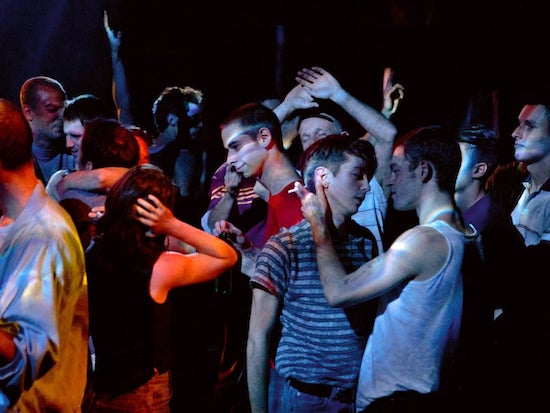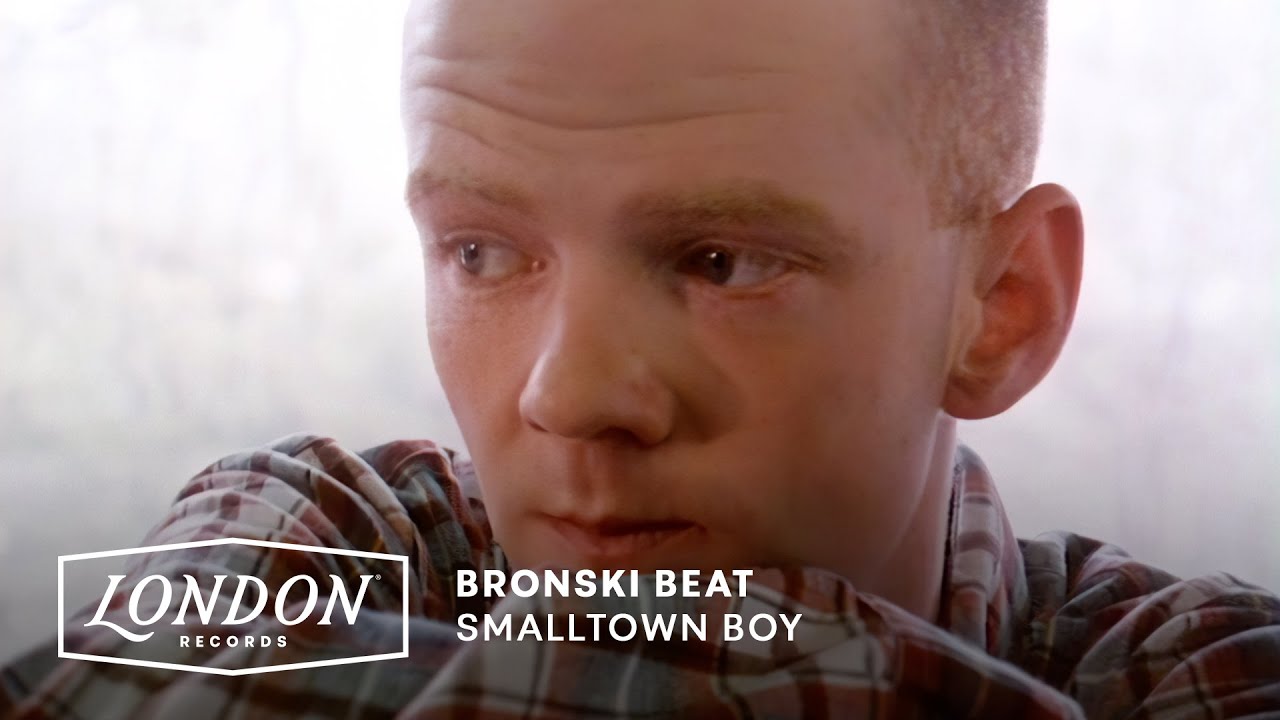A young gay man stands alone on a train platform, caught in the midst of a very on-the-nose downpour. All he has left, aside from the meagre possessions packed into his little bag, is himself. We hear what has brought the eponymous small town boy to this moment, to be stood, drenched, waiting for a train. His story, up to this point, has been of homophobic ostracism, one far from new to the queer imagination, recorded at a time when gays and lesbians were escaping hometown prejudices to the big cities in their droves – a pattern of migration that has stuck into the present. He clutches a one-way ticket.
Musically it’s more upbeat, iconic for its electrifying synths, relentless cadence and frontman Jimmy Somerville’s otherworldly falsetto, but the lyrics for Bronski Beat’s ‘Smalltown Boy,’ which won the nascent band quick fame in the early 1980s, leave very little to subtext.
Downbeat lyrics aside, few tracks evoke such potent nostalgia. It’s a decade-defining ‘80s standard, one of the sonic champions of the time when synthpop reigned king, up there with the likes of New Order’s ‘Blue Monday’ or a-ha’s ‘Take on Me’ or the best of the Pet Shop Boys. It has everything that one might expect from music of the era, from its new wave synths to the floor-filling bassline. Synthpop has been criticised for its perceived lack of artistry and emotion, but no one in their right mind would levy those arguments against ‘Smalltown Boy,’ which juxtaposes sombre themes and upbeat electronic expressionism with the utmost creative flair. Add Somerville’s astonishing vocals and a drum beat that demands head bobbing and, well, you’ve a certified banger on your hands.
Parting Glances, Bill Sherwood’s first and only feature film (he died, as with so many other gay artists of the late 20th century, of Aids-related illness) was made on a shoestring budget in 1985 and released in February 1986. 35 years old this week, it was one of the first titles to explicitly explore the North American Aids crisis. Bronski provides the soundtrack with three songs from their debut album, ‘The Age of Consent’, including, of course, ‘Smalltown Boy’. Though it was briefly in 1985’s Gotcha! as part of its contemporaneous soundtrack, Parting Glances was the first time the song would be used with such meaningful relevance. It would not, however, be the last.
The title of Parting Glances boasts a double meaning. On the one hand, it revolves around a pair of gay New York culturati, Robert and Michael, who are about to separate owing to a job offer which will take Robert abroad (the party hitherto described is his leaving do). On the other, Nick, also Michael’s ex-lover, has HIV. He’s gaunt, tired-looking – more so than Steve Buscemi usually is, though it’s apt casting – and, as his friends’ worried dialogues betray, on his last legs. Thus entwined are love and death, perennial bedfellows throughout queer history. Indeed, a similar contrast is implied by ‘Smalltown Boy’: to stay at home is to accept one’s suppression of identity and, thus, a kind of social death; to leave is to pursue freedom of the self.

It’s a pertinent song, then, to take centre stage in Parting Glances, and we hear much of it over two pivotal, juxtaposed scenes: in one, Michael and Robert have sex, and in the other, Nick records a video will. The camera introduces him by way of his flickering image on a TV screen, a distorted mirror, before slowly panning to his calmly resigned posture, ostensibly unfeeling of his predicament, reading from a prepared sheet. “Sorry I didn’t tell you about this beforehand Dad, but if I did, you would’ve freaked,” he says. The song emphasises the tragic quality of the scene, the dread that we can imagine Nick is muzzling. His stiff upper lip is armour. “Betcha didn’t think this kid from Betsonhurst had this much stashed away, did you,” he quips, before producing a dildo. “Oh, Robert. This is for you. I hope you like it.” Somerville’s falsetto rings out hauntingly, lending the scene an ethereal quality – appropriate for a man confronting his early mortality. To record his own will, nonetheless, is an act of defiance.
That ‘Smalltown Boy’ resonates so much with the queer tension between love and death finds it well placed in Robin Campillo’s 2017 Aids drama 120BPM; the historical Aids crisis, after all, literalised this tension. The film focuses on the Paris-based offshoot of the Aids Coalition to Unleash Power, a real-life direct action protest group who fought tooth and nail for the lives and rights of people with Aids. After the death of one of their comrades, the group stages a die-in protest in the heart of the city, their bodies sprawled out in the middle of the road, adorned with crosses that read “silence = mort,” a shallow mass grave formed of concrete and asphalt. Composer Arnaud Rebotini strips the song back to its most basic elements, letting it echo through the air as if reverberating from the inner walls of a church, hollow and cold. At first, all we hear are Somerville’s elongated vocals, emphasising the activists’ quiet, mournful rage; strings are later introduced, plucked with a slow, drip-drop cadence.
We cut, immediately, to the group dancing at a nightclub, whooping and hollering without a care, and with this the song takes on a more conventional, albeit minimal, production. That Rebotini emphasises Somerville’s vocals through isolation, evocative of a voice singled out in a choir, elevates the song’s sense of melancholy. In the middle of the dance floor stands Nathan, the protagonist of the film. Both he and his boyfriend Sean came to Paris from the outskirts in search of new communities; now, the latter is dying of an Aids-related illness. 120BPM burns with friction between fantasy and reality, and for a moment, Nathan imagines Sean as he sleeps in a hospital bed. The remixes slow, metronomic beat feels like a heart rate monitor. It coalesces with Sean’s laboured breathing, and he dreams of the Seine rushing with blood. That ‘Smalltown Boy’ is stripped of its genre trappings lends a sense of temporal isolation. The song isn’t just being used as period dressing. Its sorrowful cries defy any tidy chronology.
Now, 36 years since the song was recorded and released, we have a queer artwork that follows the explicit narrative of ‘Smalltown Boy’ to a tee; you might even wonder why it was named after another New Wave classic as opposed to this one. Russell T. Davies’ ‘80s-set miniseries It’s a Sin tells the story of three boys from – yes, you guessed it – small towns running off to the big city, London, propelled not just by homophobia but an abundance of aspirations and dreams. Roscoe (Omari Douglas) escapes his family of religious fanatics; Ritchie (Olly Alexander) the dominance of his hyper-macho dad; Colin (Callum Scott Howells) the implied narrow-mindedness of his hometown in Wales.

At first it’s party-after-party at the boys’ house, The Pink Palace, where they indulge in all of the hedonistic pleasures they can. Theirs is the hottest place in town, abundant with sex and drag and drinking; expression pouring out in all its most vibrant forms, unrestrained, the austere shackles of conservatism flung out of the window. Anyone who doesn’t get with the picture can too, happily, sling their hook. At the end of the first episode, however, we’re given the first glimpses of the burgeoning Aids crisis. ‘Smalltown Boy’ plays over the end credits, emphasising the paradoxical nature of the moment: all of these joys are soon to be washed away by a cosmic tragedy, and all we can do is wail. This wasn’t just a period of sorrow, though, as It’s A Sin is keen to remind us. It was too, crucially, a time of liberation.
That tension between freedom and oppression is central to ‘Smalltown Boy,’ emphasised across the moving image by Nick’s recording of a final will and testament in Parting Glances, the contrast of the dancefloor and Sean’s wilting breaths in 120BPM, and the song’s implied prescience as it concludes the first episode of It’s A Sin. Already the song draws a fairly obvious paradox between its musical composition and lyrical themes. Taken in the context of the time in which the song was recorded, though, an era abundant with social and political frictions, from Aids to the witchy grasp of Thatcherism to the mass gay migration that the song relays, it’s all the more profound.
To defy those who push and kick us around in pursuit of ourselves is a tale as old as queer history; it’s the tale of Nick in Parting Glances, of Nathan and Sean in 120BPM, of all the boys in It’s A Sin. One might hear “run away, turn away” and think it a proposition of cowardice – but it’s the bravest step one can take. The conditions that have historically undergirded the gay experience, for the better part of 70 years, continue to be immortalised across the moving image: life and death, breath-stealing tragedy and heady euphoria. That, too, is ‘Smalltown Boy’. A downbeat tale composed with 135 beats per second’s worth of synths, strings and percussion that demand you step on the rainbow floor and dance to the end of the world.



